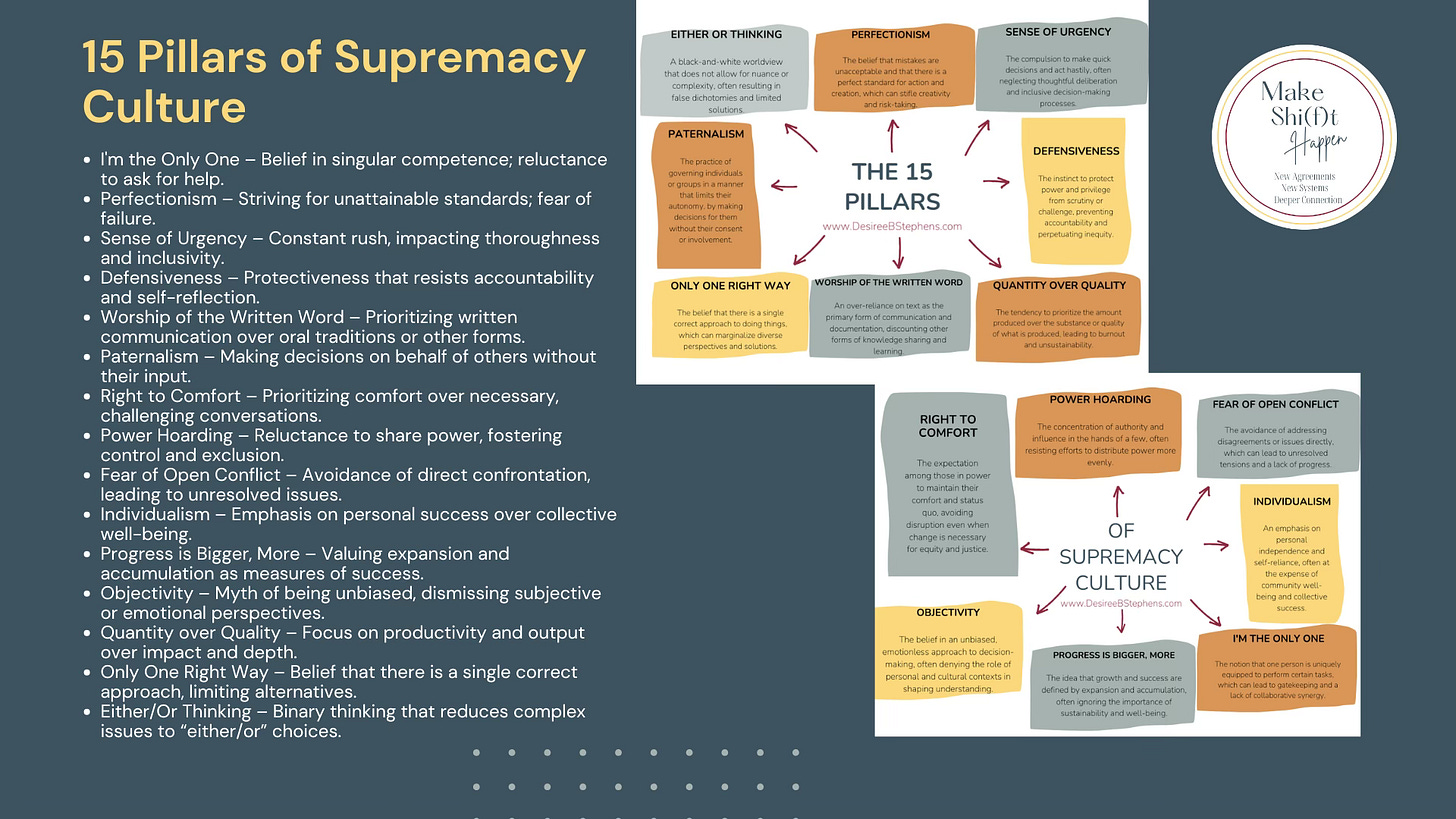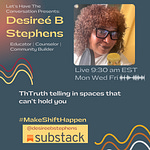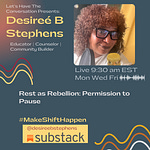Today’s 100 Days of Community live session was full of powerful engagement and deep reflection. We explored Unpacking Individualism: Why We Need Each Other and laid the groundwork for understanding the systems that keep us isolated, disconnected, and powerless.
This conversation was rooted in the foundational framework of my work: the 15 Pillars of Supremacy Culture. You can grab a printable infographic here
These pillars were first introduced as the 15 Characteristics of White Supremacy by Tema Okun, but over time, I have come to frame them as supremacy culture. Here’s why.
Why I Use “Supremacy Culture” Instead of White Supremacy
White supremacy is a very specific and violent system that targets Black, Brown, and Indigenous bodies. Its impact is devastating and must be named and dismantled. However, when we expand the conversation to supremacy culture, we open the door to anti-oppression work that recognizes how multiple systems of power harm all of us—though in profoundly different ways.
Supremacy culture acknowledges that systems of whiteness harm not only those directly oppressed by them but also those who are conditioned to uphold them. It allows us to have a more nuanced and collaborative conversation about liberation. The goal is solidarity and co-creation—a world where we all witness one another’s pain and come together to dismantle the systems that perpetuate it.
I shared this foundation today to help frame why individualism is so deeply entrenched in supremacy culture and how it keeps us disconnected. If you are interested in learning more about the 15 Pillars of Supremacy culture I invite you to download my e-book: book-Dismantling Supremacy Culture: Understanding and Overcoming Its 15 Pillars, and it is Pay_What_You_Can. We also touched on the idea of privilege vs. leverage, which I’ll explore further in a future session.
For now, let’s revisit the three key takeaways from today:
1. The Myth of Individualism as Strength
Supremacy culture teaches us that independence and self-reliance are signs of strength. This belief isolates us and keeps us from recognizing our shared humanity and collective power. Individualism isn’t a virtue—it’s a tool of oppression, designed to prevent collaboration and perpetuate inequity.
2. Interdependence is the Key to Liberation
True liberation requires us to lean into interdependence. When we embrace the reality that our freedom is tied to one another, we unlock our potential to build systems of mutual care and accountability. Interdependence is not weakness—it is our greatest strength.
3. Community as a Catalyst for Power and Healing
When we reject individualism, we create space for the transformative power of community. This is where healing begins. Community shifts power dynamics, amplifies marginalized voices, and fosters trust and resilience. Examples like mutual aid networks and collective care models show us how to redistribute resources and responsibility equitably.
How Do We Begin to Release Individualism?
Releasing individualism requires intention, reflection, and action. Here are a few steps to begin:
Recognize the Harm: Reflect on how individualism shows up in your life. Where do you feel the pressure to "do it all on your own"? How does this narrative keep you from leaning into community?
Start Small: Practice asking for support, even in small ways. This act of vulnerability can be a first step toward building trust and connection.
Create Space for Collaboration: Whether in your work, family, or community, invite others to co-create solutions. Collaboration redistributes power and nurtures relationships.
Engage in Collective Care: Look for ways to contribute to your community, whether through mutual aid, shared childcare, or offering your unique skills to a larger effort.
Reframe Your Mindset: Reflect on what interdependence means for you. Ask yourself, How can I shift from "me" to "we" in my daily life?
A Note on Privilege vs. Leverage
While privilege often focuses on the unearned benefits one holds in a system of oppression, leverage invites us to consider how we use our privilege to disrupt those systems. This distinction is critical, and though I didn’t delve deeply into it today, I look forward to unpacking it in a future session.
Tomorrow’s Topic: How Supremacy Culture Disconnects Us—and How to Rebuild Trust
As we continue 100 Days of Community, we’ll dive into how supremacy culture thrives on disconnection. It erodes trust—both in ourselves and in others—and prevents us from building the connections necessary for liberation. But trust can be rebuilt, and tomorrow we’ll explore how.
An Invitation to Join Us
The first 10 days of 100 Days of Community are free and open to everyone. After that, the series will continue exclusively for paid subscribers. If you join during the free period, you’ll receive 20% off for the year.
And as always, if financial barriers are an issue, please reach out to scholarships@desireebstephens.com—because liberation must remain accessible to all.
This work is about more than unlearning—it’s about reimagining. Together, we can move beyond systems that isolate us and into a world where connection, care, and community are at the center. Thank you for being part of this journey.
In solidarity and liberation,
Desireé B. Stephens CPS-P
Educator | Counselor | Community Builder
Founder, Make Shi(f)t Happen
Join me for my next live video in the app















Share this post